 The principle of the Responsibility to Protect, endorsed unanimously by the United Nations in 2005, is an important component of a global, collective security system. But invoking it inaccurately will do little to help the victims that is was designed to protect, writes Adrian Gallagher (European Centre for the Responsibility to Protect, University of Leeds).
The principle of the Responsibility to Protect, endorsed unanimously by the United Nations in 2005, is an important component of a global, collective security system. But invoking it inaccurately will do little to help the victims that is was designed to protect, writes Adrian Gallagher (European Centre for the Responsibility to Protect, University of Leeds).
• Disponible también en español
The Responsibility to Protect (RtoP) was unanimously endorsed by the member-states of the United Nations at its World Summit in 2005. The agreement sets out to protect people the world over from four crimes: genocide, war crimes, crimes against humanity, and ethnic cleansing.
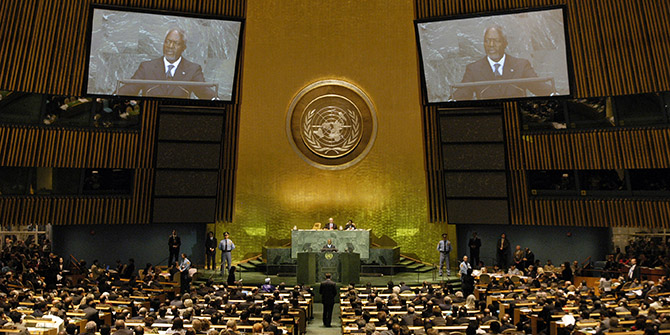
Invoking the Responsibility to Protect in Venezuela
In September 2018, Peru, Paraguay, Chile, Argentina, and Canada requested that the International Criminal Court (ICC) investigate the alleged crimes of the Maduro regime in Venezuela in order to establish whether they constitute crimes against humanity as defined in Article VII of the Rome Statute. As a result, prominent political figures began to invoke the RtoP. The Secretary-General of the Organization of American States, Luis Almagro, declared:
“[W]e must act in accordance with public international law – including the UN’s 2005 Responsibility to Protect commitment to prevent genocide – and international criminal law, and the international norms that protect democracy and our rights and freedoms.”
More recently, the RtoP has resurfaced in the midst of the ongoing battle for legitimacy inside Venezuela.
In late January 2019, the President of the National Assembly Juan Guaidó declared himself interim President of Venezuela, a status recognised by 50 countries (including the United States) but vehemently rejected by Russia as “flagrant interference”.
When Guaidó arranged in late February to try to bring aid donated by the US into Venezuela via Colombia, Brazil, and the Caribbean, Russian Foreign Secretary Sergei Lavrov denounced the move as a “hypocritical pretext of humanitarian aid” designed to help pursue regime change.
And shortly after, the former United Nations Independent Expert on the Promotion of a Democratic and Equitable International Order, Alfred De Zayas, tweeted that:
“The R2P ‘doctrine’ is nothing but a pretext for military aggression which remains prohibited and a crime under the ICC statute, because the R2P cannot replace the UN Charter and a pertinent Security Council resolution. But the media still peddles the ‘fake legality’ of R2P.”

Misunderstanding the Responsibility to Protect
This statement is just one of many examples of high-profile political figures misunderstanding the RtoP. It rests on three assumptions that are simply inaccurate, thereby creating barriers to understanding how RtoP can be applied to real-world crises such as the one occurring today in Venezuela.
First, the RtoP does not permit military aggression as defined by the ICC. In fact, it acts as a barrier to it. Yes, the RtoP does allow states to consider all coercive and non-coercive measures under Chapters VI, VII, and VIII of the UN Charter when a government is “manifestly failing” to protect its population from the four crimes. Though this does include the use of force, any action taken has to be authorised by the UN Security Council. In other words, any US-led use of force without the consent of the Security Council cannot be undertaken on the grounds of the RtoP.
Second, the RtoP does not set out to replace the UN Charter. Rather, the RtoP was forged within the UN system. It is a UN-led response to the problem of mass-atrocity crimes, and as already noted, it requires UN Security Council authorisation. As such, it is simply inaccurate to suggest that the RtoP sets out to replace the UN Charter.
Third, the RtoP should not be viewed as having “fake” legal credentials. It is correct to say that the RtoP did not create any legally binding obligations in international law, but this does not mean that it is legally void. The RtoP is a political and moral commitment built on pre-existing international legal agreements like the 1948 UN Convention on the Prevention and Punishment of the Crime of Genocide and the 1998 Rome Statute, the latter outlining legal obligations around genocide, crimes against humanity, and war crimes.
If this is all correct, why do prominent figures speak of the RtoP in such a toxic manner? The answer, in large part, relates to its use in Libya in 2011.
There, the UN Security Council invoked the RtoP in response to the threat of mass violence from Colonel Gaddafi’s regime. The subsequent attempt at regime change led by the US, the UK, and France then created a backlash as many states (including Russia, China, and South Africa) felt that they had been duped.
The power vacuum and civil war that followed made crimes against humanity the norm in Libya, which is precisely what the intervention was meant to prevent. This failure in Libya has cast a long shadow. Notably, the same three countries that expressed indignation over how RtoP was applied in Libya – Russia, China and South Africa – voted against the US’s recent proposal of a Security Council Resolution on Venezuela.
Does the Responsibility to Protect apply in Venezuela?
All of this begs the question of whether or not it is even right to talk about the RtoP in relation to Venezuela. As already noted, the UN Security Council can discuss coercive and non-coercive measures under Chapters VI, VII, and VIII of the UN Charter, and this allows us to clarify what the RtoP does and does not say.
For example, the RtoP does not say anything about democracy promotion and should not be used as a vehicle to promote any action along these lines. Essentially, the RtoP is about human protection from the most heinous crimes in international relations, and this should not be forgotten.
Accordingly, the international community should use diplomatic channels to urge Maduro’s government to fulfil its domestic RtoP. If, as has already happened once, efforts are made to move humanitarian aid into Venezuela despite government roadblocks, it is also vital that Maduro prevent the armed forces from perpetrating mass violence against non-combatants.
Meanwhile, the UN Security Council could authorise the UN to establish a Commission of Inquiry to establish whether crimes against humanity are taking place. Any such fact-finding mission would help the Security Council to establish whether the government in question is “manifestly failing”. On this note, it is important that those who champion the RtoP do not overstate the scale of the crimes being committed. OAS Secretary General Luis Almagro has invoked the Rwandan genocide as a pretext to justify RtoP action in Venezuela, but clearly any such analogy is deeply flawed, as there is no pending threat of mass genocide.
In short, what is needed is a Security Council that works as a collective security system to uphold and enforce the RtoP. What is not needed is the inaccurate invocation of RtoP as part of a geopolitical game that does little to help those that the principle was established to protect: namely, victims of genocide, war crimes, crimes against humanity, and ethnic cleansing.
Notes:
• The views expressed here are of the authors and do not reflect the position of the Centre or of the LSE
• Please read our Comments Policy before commenting


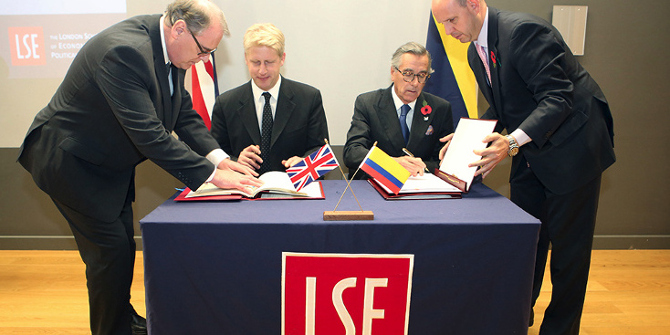
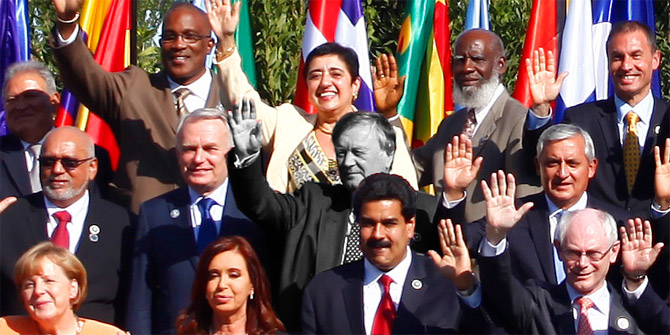
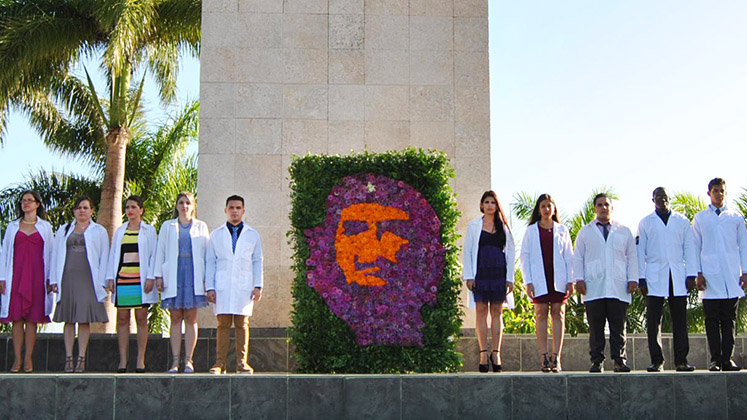
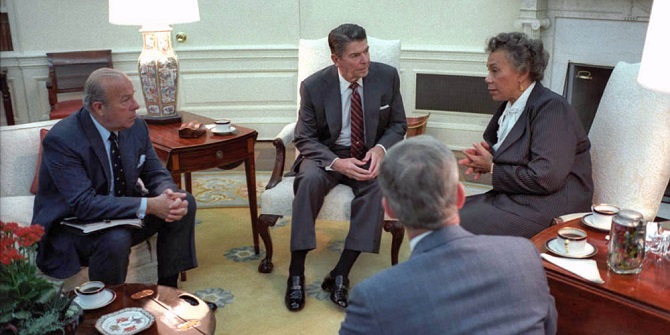
Professor, do you not think that the long-awaited reform of the Security Council is necessary? Since in my opinion, at the moment, every action is paralyzed by crossed vetoes, often dictated by political motivation, which block any action to protect a people, it is not by chance that we have never intervened in a decisive manner to defend and protect the people ” Palestinian”. As for the RtoP I think that in the future it could be an excellent tool for defense and rapid intervention, through one of the three pillars that characterize the RtoP, in your opinion how should RtoP be implemented? Could it somehow become an instrument of intervention following even a conviction by the International Criminal Court?
Thank you
Dear Gabriele,
Thank you for your comments.
We hear all the time that the UN Is paralysed but in fact, unlike when it was paralysed in the Cold War, it passes Resolutions every week. See a report this week by International Crisis Group https://www.crisisgroup.org/global/002-seven-opportunities-un-2019-2020
In relation to Palestine, there has been some writings on the conflict but not many. I guess the stark reality is that the crisis is so complex with such a vast history, it is difficult to see how the RtoP can actually add anything new. The RtoP acts to remind states that they have a responsibility to protect populations from the four crimes and if necessary the international community (through the UN) can use all options under Chapters VI, VII, and VIII of the UN Charter but this decision is made on a case-by-case basis and the one you refer to as complex as it gets.
I suggest following people like Richard Gowan and Mark Kersten on Twitter if you are interested in these debates.
Best wishes,
Adrian
Dear Alfred (if I may),
Thank you for engaging with the piece. If I can raise four points to help clarify my position and respond to the concerns you raise.
1. Can you explain what you mean by an “artificial” crisis? Are you suggesting there is no crisis or are you accepting that there is a crisis but highlighting that this is human-made? I would agree with the latter position but not the former.
2. The Responsibility to Protect sets out to prevent genocide, war crimes, crimes against humanity, and ethnic cleansing. Accordingly, if it is the case that the Government or any other actor[s] is perpetrating or intends to perpetrate any of these four crimes then the international community has a political and moral responsibility to fulfil the RtoP. To be clear, this includes their prevention not just responding once crises have flared up.
3. Yes. You are right to explain that principles of non-interference exist in certain documents but of course, political elites knew this when they agreed to the RtoP. This leads onto the next point.
4. You are right to say that some states rejected the RtoP in 2009 but there has been an annual informal debate at the General Assembly every year since as well as a formal debate in 2018. The best post-Libya data I have is Quinton-Brown’s 2013 study (in the journal Global Responsibility to Protect) which identifies 13 states ‘reject’ the RtoP. This notably includes Venezuela (the others are Algeria, Belarus, Bolivia, Cuba, Ecuador, Iran, Nicaragua, North Korea, Pakistan, Sudan, Syria, and Zimbabwe). Many of these states share your concern that the RtoP is a ‘trojan horse’ in that it could be used to allow states such as the US to intervene whilst pursuing ulterior motives. My response to that is that the RtoP should be understood as both a ‘licence’ and a ‘leash’ (as argued by Professor Michael Doyle in a special edition journal of International Politics in 2015). Yes, it allows for the use of force to be used (licence) but also calls for UN Security Council authorisation and therefore acts as a leash that attempts to reign in unilateral action and highlight that such interventions are illegitimate.
Kind regards,
Adrian
The “humanitarian crisis” in Venezuela is artificial. R2P has no application in Venezuela. The solution to the crisis depends on lifting the illegal sanctions, ending the financial blockade, the internal and external sabotage and the economic war. R2P is only a GA Resolution, rejected by a considerable number of States during the review conference in July 2009. The principles of non-intervention and non-interference in the internal affairs of sovereign States belong to customary international law and have been reaffirmed in General Assembly resolutions, notably 2625 (XXV) and 3314 (XXIX), and in the 1993 Vienna Declaration and Programme of Action. Article 32 of the Charter of Economic Rights and Duties of States, adopted by the General Assembly in 1974, stipulates that no State may use or encourage the use of economic, political or any other type of measures to coerce another State in order to obtain from it the subordination of the exercise of its sovereign rights.”